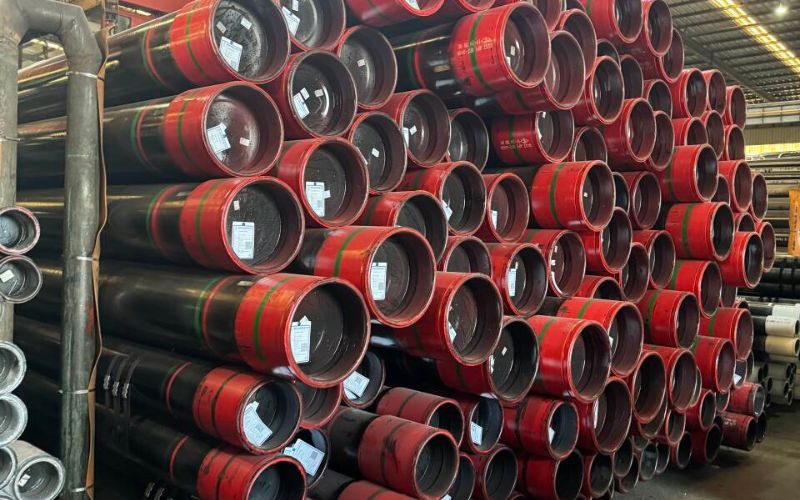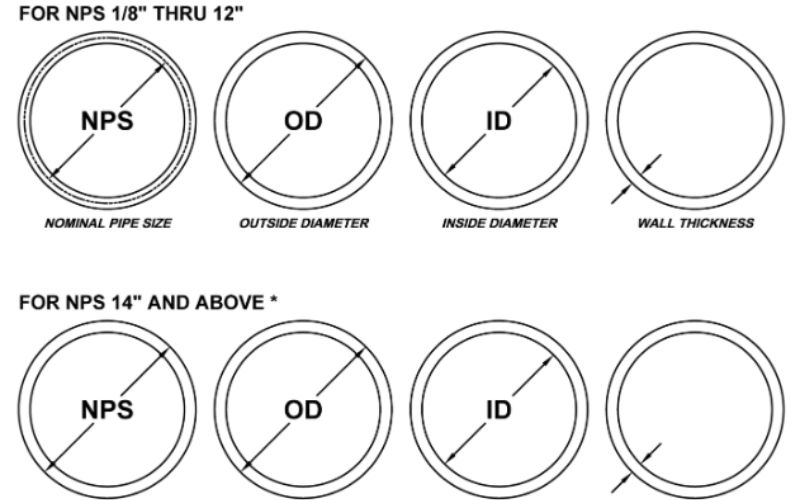Overview of Black Steel Pipe
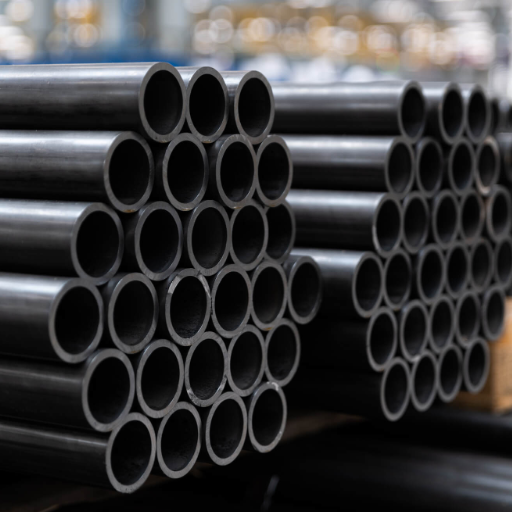
Black steel pipe serves as one of the materials in structural and industrial marketing applications, and steel is very durable and versatile. Unlike galvanized pipe, it has no coating, giving it a dark surface with which it obtains its name. Black steel pipe, mostly made of carbon steel with very few additives, is preferred because of its strength, economy, and resistance to high-pressure settings. It is often used in water and gas transport, structural support in construction, and machinery. It is considered a very versatile material, balancing its reliability and cost-efficiency, for use freehand or professional.
Definition and Characteristics
Unicoated surface black steel pipes and a sturdy make are chiefly prepared from carbon steel. Their defining characteristic is that they are not galvanized and, due to the fabrication process, they churn out a characteristic dark-scaled finish. Black steel pipes offer maximum tensile strength and durability and are thus used in gas and water transportation under high pressure.
The important feature in this is that it endures extreme temperatures and is wear-resistant, making it highly reliable for industrial uses. Black steel pipes are usually made within the range of 0.5-36 inches in diameter according to the latest industrial specifications, with thickness thereof expressed on a schedule (usually schedule 40 or 80). Depending on the material grade and wall thickness, the pressure rating could go as far as 1,500 psi.
It possesses the strength and versatility that black steel imbibes. These pipes find a huge application not only in plumbing and gas transfer but also as structural materials in construction works. They have, thus, been ranked the cheapest option in the past century given large projects that require economic and durable materials, particularly when considering alternatives like cast iron. Their structure supports machinability, so that they may be cut and threaded for particular requirements of a given project, including those involving malleable materials.
Comparison with Other Types of Pipes
Black steel pipes are uncoated, fire-resistant, and ideal for gas transmission, while other pipes like galvanized and carbon steel differ in coating, corrosion resistance, and applications.
| Key Point | Black Steel | Galvanized | Carbon Steel |
|---|---|---|---|
| Coating | Uncoated | Zinc-coated | None |
| Corrosion | Moderate resistance | High resistance | Low resistance |
| Use | Gas, fire systems | Water supply | High-pressure systems |
| Durability | Fire-resistant | Long-lasting | Susceptible to rust |
| Cost | Moderate | Higher | Lower costs can be achieved by utilizing materials like ordinary iron or affordable black steel pipe in construction projects. |
Strength and Durability
Known for their extraordinary strength and durability, black steel pipes are by far the best option for demanding and rugged purposes. Manufactured from bare steel, these pipes withstand high pressures and heavy loads, their presence in masses of industrial and infrastructural projects signifying great demand, especially for those mainly used in gas distribution. Their mechanical wear resistance makes them last plenty of years if subjected to vibration or some kind of physical stress.
Further engineering advancement has proved that indeed they can be considered durable, especially when utilizing carbon steel pipe. Black steel pipes could withstand pressures of at least 150 psi, depending on their thickness and diameter; this makes them usable in fire sprinkler systems and gas distribution networks. Besides, their possible corrosion in a dry place is almost negligible, keeping up with their integrity for a long time.
While galvanized pipes have zinc coatings as corrosion protectors, black steel pipes are valued for their raw strength. They constructability forces provide the strength for structures such as bridges, oil refineries, and power plants. Being able to withstand temperatures between -20°F and 400°F tells more about the reliability under all atmospheric conditions rightly so has made its presence felt in different residential and industrial projects.
Common Uses and Applications of Black Pipe
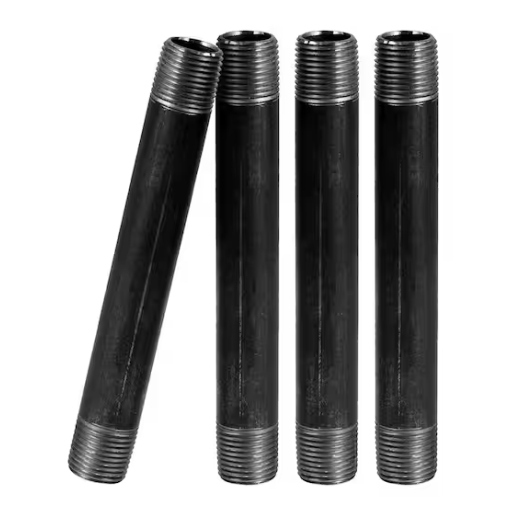
Useful in various types of installations, black pipe finds versatility due to its durability and strength. In general usage, it is distinguished for:
- Gas Distribution: It is used in carrying natural and propane gases to homes and commercial buildings.
- Fire Sprinkler Systems: Water delivery in fire protection systems is an area where black pipe finds dependable use.
- Construction Frameworks: It is used as a sturdy material for building support in commercial construction.
- Oil and Petroleum Pipelines: Due to its durability and heat resistance, black pipe transports oil and other liquids.
All these uses point toward the instant need for such commodities in various critical industries.
Construction Industry Roles
“Black pipe” is the very backbone of the construction ecosystem, offering the best product life and applicability in diverse uses. Black pipe is renowned practically for its tensile strength and resistance to stresses to impart stability to edifices and large-scale engineering projects. According to industrial solicitation, in face scaffolding systems, black steel pipes are usually employed due to their ably carrying capacity and being prevented from bending under pressure. Further, black pipes, with their anti-corrosive properties, are normally recommended for use in underground construction, where varying degrees of moisture contamination are to be expected.
World demand for steel pipes, including black pipe, has seen a steady rise. Data released recently shows that the global market for steel pipes hit around $142 billion in 2022, with a majority going to construction. This is a testament to the continued use of black pipe for construction work considered to be of critical importance. Furthermore, innovations within the protective coatings and new methods of manufacture are now providing greater advantages to black pipe, improving its efficiency where safety-critical and long life infrastructure works are concerned. Combine this with the virtues of strength and versatility, and black pipe is very much still the material of choice for the demands of evolving modern construction practice.
Gas Transportation Efficiency
Gas transportation comes such in the establishment of infrastructure, reliable or efficient equating to transport. The black pipe, in short, finds itself at the heart of it all. Being tough and able to cope with high pressure, it is well suited for the long-distance, safe transport of natural gas and any other gases. The researches have revealed that when black pipe systems are properly installed, they minimize the possibility of leaking, thus protecting the environment and fulfilling the industry standards.
Significant technological developments hence resulted in further enhancing blacks pipe efficiency. Seamless pipe manufacture allows fewer weak points to arise, thus making the whole system somewhat reliable. In another instance, energy loss during transportation has been progressively reduced according to industry reports, and new black pipe systems can deliver gas at an efficiency of about 95%. Such development has provided savings in operational costs and reduced the carbon footprint of gas transport networks.
Moreover, cutting-edge sensors and monitoring systems are increasingly being used in conjunction with the black pipe system. These allow real-time monitoring of pressure and flow rates, issuing immediate warnings about potential issues to avoid downtime and uninterrupted gas supply. The marriage of strong materials, advanced techniques, and integrated technology marks the black pipe as a crucial element in modern gas transportation efficiency, particularly as it is used to carry gas.
Applications in Agriculture and DIY Projects
Due to the variety of applications that can be construed out of strength, users also accept applications on the black pipe in agriculture and in DIY areas. Black pipe for irrigation systems, fencing frames, and greenhouse supports is mostly found in agricultural environments. Due to these pipes resisting very high-pressure level and corrosion, they are picked for delivering water towards big farm fields as their irrigation is quicker despite unfavorable environmental conditions. Additionally, black pipes in the greenhouse are able to hold plastic sheets or other materials in place as sturdy frameworks to establish a controlled environment for growing.
DIY enthusiasts have flocked to black pipe to create industrial-style furniture and complement home improvements. Black pipe presents a rugged finish and sturdy feel that appeals to the rustic and modern line interior style. Demand for black pipe for DIY projects is increasingly significant, especially for younger homeowners who favor inexpensive and sustainable building materials. Its ease in customization, threading, and modular assembly sets it apart in making working spaces that can be tailored to projects of any scale.
These uses demonstrate how black pipe adapts to different needs demanded by various sectors of activity, and as such, it stands not just as a mere utilitarian material but as an alternative for artistic and innovative solutions to contemporary problems.
Pros and Cons of Using Black Steel Pipe
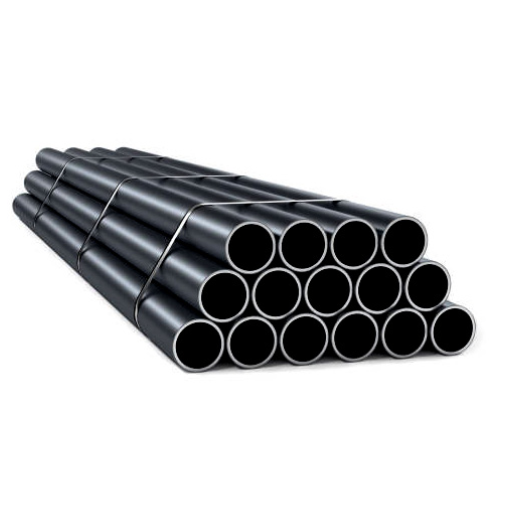
Black steel pipes are durable, cost-effective, and fire-resistant but are prone to corrosion, heavy, and have a rough inner surface.
| Key Point | Pros | Cons |
|---|---|---|
| Durability | High tensile strength | Prone to corrosion |
| Cost | Affordable | Maintenance required |
| Fire Safety | Fire-resistant | Heavy and laborious |
| Versatility | Easy to fabricate | Rough inner surface |
| Applications | Widely used | Limited rust-proofing |
Advantages of Black Steel Pipes
One of the big advantages of black steel pipe is durability—they have a great deal of resistance to wear-and-tear and hence are good for long-term applications in any situation. Another benefit I personally like is their versatility ranging from industrial projects to artistic home designs. In addition to being affordable and easy to come by, black steel pipe keeps me within the budget and still cranks up on the quality. Compatibility with many options for customization-worthy of admiration-eases the road for me to fine-tune it to meet special needs with minimum hassle. Since black steel pipes stand as maybe the most dependable, feasible, and flexible element needed for any use, they average high in application.
Disadvantages and Limitations
Each versatility comes with its so-and-so limitations and disadvantages, corrosion being the major one. There are corrosion complaints with black steel pipes as these pipes are not galvanized or coated. Rust formation and degradation against moisture exposure would potentially be the major source for corrosion, especially if exposed outdoors or with adverse moisture conditions.
Aside from that, another reason that might stand in the way is that these pipes are heavier in weight, especially as compared to PVC or aluminum, so this weight bill to moving about and installation. High weights will seemingly stand in the way in applications where lightweight material is at a premium, such as certain structural or mobile construction formats.
Another downside is the lack of flexibility posed in certain instances. These pipes, being black steel pipes, are extremely durable and strong, but also utterly rigid, posing difficulty in bending them into curved or awkward shapes that their application in a complex design or system may require. On the other hand, welding and cutting to make any adroit modifications would bring more time and resources to whether the project on cost.
These pipes don’t apply well when chemist corrosion or high-temperature application precision is needed. For instance, they generally are not used in highly corrosive setups and/or transportation of potable water because they would result in water contamination due to their material characteristics.
Such limitations should be observed to ensure the black steel pipes are indeed applicable for the job. By balancing the pros against the cons, an output will take into account both performance and cost-efficiency factors.
Comparative Analysis with Galvanized Pipes
There are different uses for black steel pipes and galvanized pipes, and having this distinction really helps in choosing the right material for any project. One major distinguishing feature is the protective layer. Black steel pipes have no coating and thus rust when in contact with certain environments; meanwhile, galvanized pipes get a light coating of zinc to prevent corrosion, mainly in moist or outdoor environments.
Considering durability, galvanized pipes are excellent in places where moisture or mild corrosion presents a threat for a life span of two to five decades, depending upon the quality of water and the environment. But if temperatures are too high, galvanized pipes become less worthy of being called pipes, as the coating zinc gets degraded leading to contamination or structural weakening. The black steel can sustain extreme temperatures without losing structural integrity and exact applications of carrying natural gas and fire sprinkers would require such conditions.
Cost was another major consideration for the comparison. Black steel pipes tend to be more economical mainly because they undergo simpler processing. Therefore, when corrosion resistance is of little accounting, they present the most economical solution to design. Galvanized pipes can, however, return the higher initial cost of purchase if installed in conditions conducive to rusting and can proscribe maintenance and replacement costs due to their corrosion resistance.
Plumbing-wise, galvanized pipes are used where corrosion is a concern, such as potable water lines, and minimize contamination during water transportation. Black steel pipes, on the other hand, are avoided in drinking water systems for rust and contamination reasons but see widespread use in industrial gas systems and mechanical applications.
Answering this question depends heavily on the needs of a project-specific environment, temperature, budget, and material-duration needs. A proper choice must be made balancing all three” performance, safety, and cost-effectiveness” once these factors have been weighed.
Installation and Maintenance Tips for Black Pipe
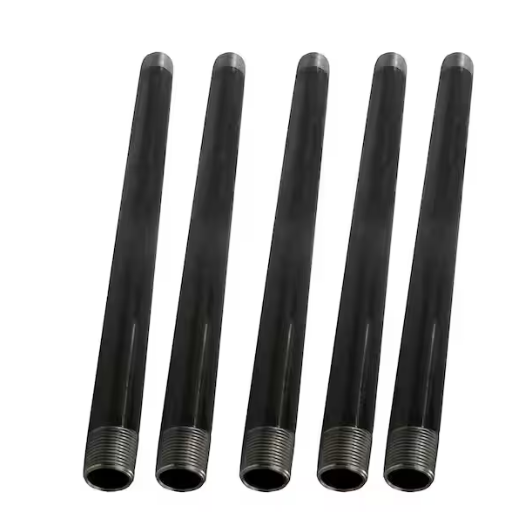
Proper installation of black pipes involves cutting, threading, and sealing joints, while maintenance includes regular inspections, cleaning, and applying protective coatings to prevent corrosion.
| Key Point | Installation | Maintenance |
|---|---|---|
| Cutting | Use pipe cutters | Not applicable |
| Threading | Apply Teflon tape | Not applicable |
| Sealing | Use pipe dope | Not applicable |
| Inspection | Not applicable | Check for leaks, rust |
| Cleaning | Not applicable | Remove rust, debris |
| Protection | Not applicable | Apply coatings |
| Support | Use proper hangers | Ensure stability |
| Replacement | Not applicable | Replace damaged pipes |
Proper Installation Techniques
When installing black pipes with smart skills, the name of the game should be accuracy and safety during installation so that it may perform and last well. Make a thorough inspection to include his or her eyes, linguates, whenever present, to find any signs of cracks or rust that would hinder system integrity. Using a pipe cutter or hacksaw will bring to bear, if proper cutting tools are employed, smooth and precise cuts to prevent jagged edges or deformations as much as possible.
The pipes should be threaded correctly so that the pipes can develop secure and leak-proof joints. A good-quality pipe threading machine must be used in threading pipes to make clean thread more capable of sealing with a thread sealant or Teflon tape against leakage. Joints will be tightened during assembly using pipe wrenches, but avoid over-tightening, as very heavy loads can destroy the thread or the pipe.
Besides, alignment should be treated with utmost priority while installing the pipes; a slight misalignment can lead to a joint coming under undue stress, which in turn leads either to leakages or outright system failure. Proper support is given to the pipes with brackets or hangers to assure their stability and that the weight disperses evenly, especially with larger systems.
To conclude, finish the installation by pressure testing the system to check all the joints’ integrity and ascertain whether any leaks exist, particularly in systems used to carry gas. Inspections and maintenance on a routine basis following installation will ensure that the black pipe system lives longer and can be relied upon for more challenging applications, such as those used to carry gas.
Maintenance Practices for Longevity
The maintenance of black pipe systems is to ensure their longevity and best performance; hence, consistent maintenance must be carried out. Upkeep acts as the intervention prior to requiring major repairs; hence it is also a safety aspect, especially where demand levels are high. Maintenance practices that should be considered include:
- Routine Inspection
Do inspections at least once every six months and when needed. Notice any wear, rust, corrosion, or any physical damage to the steel pipes. Give special attention to joints and connections that are usually the weakest points. - Pressure Testing
Pressure testing for leakage is essential to ensure that the black pipe system can reliably carry gas without any issues. Carry out pressure tests in-house for the investigation of possible leakage phenomena. Leaks gradually enlarge and cause loss of efficiency; in some situations, leaks constitute an immediate safety hazard. For very small leaks, hose soap may be sprayed around joints and one may listen for the audible hiss; ultrasonic leak detection will pinpoint leaks more precisely. - System Cleaning
Keeping the system clean through the removal of abrasions and debris has to be a daily task. Sediment build-up can internally block the flow of water and thereby stress the system. Routinely flush the system with adequate cleaning substances to keep pathways clear. - Application of Anti-Corrosion Coatings
Anti-corrosion coatings should be applied to pipes to prevent rust under conditions especially conducive to moisture or corrosive substances and may require reapplication every few years as deemed fit from time to time. - Tighten Loose Fittings
Go through all the fittings and make sure they are tightened properly to ensure that the black steel pipe can effectively carry gas without leaks. Vibrations, temperature changes, and the normal course of use may cause fittings to loosen over a period of time, which would result in leaks or instability to the system. - Monitor Environmental Factors
Consider the possibility whether in the environment of your installation excessive humidity is present, chemical attacks are to be expected, or if temperature might be high enough to affect pipe integrity. Stand controls such as ventilation and/or insulation to avoid their harsh effects. - Replace Worn or Damaged Sections Promptly
Any damaged or worn section of the pipe should be replaced immediately rather than undertaking temporary measures. This ensures continued reliability of the system and averts major issues. - Maintain Records of Maintenance
A log of inspection, repair, and upgrade activities should be kept. This information is invaluable for keeping reports of the performance of the system over time and determining recurrent problems.
When practiced, these maintenance activities will ensure the durability and efficiency of the black pipe system despite harsh operating conditions. Detailing all work done to the system and carrying out proactive maintenance are ways to ensure system integrity and maximize the system’s life.
Handling Corrosion Risks
Corrosion presents a considerable threat posed on the integrity of the black pipe systems, especially under trying weather conditions. An understanding of causes and formulation of remedial action thus become pertinent for any effective corrosion prevention. Corrosion mainly sets in on exposure to moisture, oxygen, and other chemicals, thereby slowly breaking down the pipe material.
The corrosion-protective coatings such as an epoxy or polyurethane paint can be successfully applied to a pipe to keep corrosive attack away. Research shows that coated pipes can last 50% longer than the uncoated ones in harsh conditions. On the other hand, corrosion can be greatly minimized through cathodic protection, which uses either sacrificial anodes or impressed current systems. This is a method well-known and applied among those requiring long-term reliability in their installations, such as in oil and gas or water distribution networks.
Large-scale rusting incidents can occur when ample time for corrosion is given. Hence, protection from corrosion is a major point rather than merely dealing with rust after it has set in. An ultrasonic thickness gauge and corrosion sensors are indeed helpful in detecting material loss in its initial stages so that intervention can be made in time. Anomalies in the statistical data for corrosion from the above devices may indicate sites whose conditions encourage corrosion. For instance, pipelines exposed to sea salts and varying temperatures have shown that corrosion rates in fact are higher, thus suggesting that maintenance patterns have to follow site directions.
The combination of protective methods, maintenance, and state-of-the-art monitoring devices substantially lowers corrosion risk, ensuring that the black pipe systems retain their structural integrity even into an extended life span. It both saves operations and contributes towards cost efficiency and enhanced safety standards.
Reference Sources
-
University of South Carolina – Mechanical Pipe and Piping Accessories
Discusses the use of black steel pipes in mechanical systems, including specifications for ball valves and fire-rated applications.
Link to source -
CiteSeerX – Installation and Welding of Steel Piping
Covers the applications of black steel pipes in welding and ferrous metal piping systems.
Link to source -
CiteSeerX – Plumbing-Supply Piping
Details the use of black and galvanized steel pipes in plumbing systems, conforming to ASTM standards.
Link to source - Top Black Steel Pipe Supplier In China
Frequently Asked Questions (FAQs)
Black pipe, also known as black steel pipe, is primarily used for carrying natural or propane gas. Its durable construction makes it ideal for gas lines in residential homes and commercial applications. Additionally, it is commonly used in fire sprinkler systems due to its ability to withstand high pressures.
Black iron pipe and black steel pipe are often confused, but they serve slightly different purposes. Black iron pipe is typically used for gas lines and is resistant to corrosion, while black steel pipe is more commonly used for water transport and other applications requiring high strength and durability.
Black steel pipe is mainly made from carbon steel, specifically A53 grade. This type of steel is favored for its strength and resistance to corrosion. The manufacturing process often involves creating a seam or a seamless steel pipe, depending on the application requirements.
Yes, black steel pipe is considered a safer pipe option for gas lines. Its robust construction and ability to handle natural gas or propane make it a reliable choice. Additionally, it is designed to minimize the risk of leaks, ensuring a safer environment for users.
Yes, black steel pipe can be used for carrying water. However, it is essential to consider that the pipe may corrode over time, particularly if the water is acidic. For this reason, galvanized steel pipe is often preferred for water transport as it is resistant to corrosion.
Seamless steel pipe offers several advantages, including increased strength and reduced risk of leaks. Since there are no seams, the chances of flaking or clogging are minimized, making it an excellent choice for high-pressure applications, such as gas lines and fire sprinkler systems.
Black and hot-dipped galvanized steel pipe is commonly used in applications where corrosion resistance is crucial, including those that are used for fire sprinkler systems. This includes outdoor installations, plumbing, and construction projects that require durability. The hot-dipped process ensures that the surface is protected from iron oxide and other corrosive agents.
Black steel pipe is available in a variety of sizes to meet different application needs. Whether you’re looking for small diameters for residential plumbing or larger pipes for industrial use, there is a range of options to choose from, ensuring that you can find the right fit for your project.



